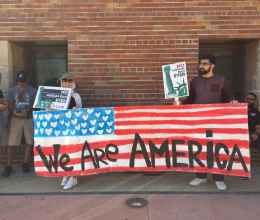In 2010, the ACLU put out an ad featuring a picture of President Obama morphing over several frames into a picture of President Bush and asking, "What will it be, Mr. President? Change or more of the same?" Now, we may need to revise it, because while Obama definitely seems intent on more of the same, he looks and sounds more and more like President Nixon.
In 1977, Nixon baldly stated, "When the president does it, that means it's not illegal." The statement alone is chilling enough, particularly in the wake of the Watergate scandal, but its precise context only makes it more so. Nixon was responding to the question, in his famous television interview with David Frost, "whether there are certain situations . . . where the president can decide that it's in the best interests of the nation . . . and do something illegal."
Nixon's circular statement neatly sums up the imperial presidency and the dangers created when the constitutional balance is upset and the president wields unchecked power. It also bears a striking resemblance to the justifications this administration has used to justify the targeted killing program. And it underscores the way in which the executive branch tends to push the limits of its authority and often exceeds it.
Consider how the targeted killing program -- at least the little that we know about it -- seems to have expanded just in the last year.
Last March, the Obama administration claimed the authority to kill people, including U.S. citizens, in countries in which we are not at war if the president determines them to be a significant threat to the nation. It claimed authority to do this -- to kill Americans -- without any review of the standard for determining when an individual is a significant threat or the evidence against any particular individual, either before or after the killings.
We were told to trust the president, that there is nothing to see or question here, because he understands the need to be "judicious," and because he personally makes the final call on the names of those to be added to the kill list. And we were told that the executive branch alone should decide whether constitutional safeguards are satisfied when the government claims authority to kill.
In other words, if the president orders the killing, it must be legal.
Now, based on a leaked white paper, we learn that the president believes that an "informed, high-level" official of the U.S. government may order the killing of an American -- even if the official has no information suggesting the target is engaged in an active plot to attack the U.S. -- without the president's personal and specific approval.
In other words, if some undisclosed official in the executive department orders the killing, it's legal?
The president seemed intent on garnering credit for making himself personally responsible for these targeted killings. He deserves nothing but the harshest criticism, however, for claiming that the executive can wield the power to kill U.S. citizens with no accountability, whether before or even after the fact.
U.S. citizens, even those accused of being enemies of the state, have the right to due process under the Constitution, and the president can't unilaterally decide that he has provided all the process that is due when he decides to kill them. We should trust neither Obama nor any other president to make such grave decisions without the basic checks and balances that the Constitution has demanded for over two hundred years. That would be true even if we had not lived through the past 10 years, in which so many individuals, including American citizens, have been wrongly accused of being terrorists.
If Obama wants to follow the lead of any past presidents, he might want to consider James Madison, who warned that abuse of power and loss of liberty "at home" is most likely to be justified by "provisions against danger, real or pretended, from abroad."
If the president can unilaterally implement a secret program that kills U.S. citizens abroad based on secret legal standards and secret evidence, what's to stop him from engaging in similar targeted killings here at home? Won't due process likewise give way when balanced against the need to protect other Americans? In other words, won't the alleged threat to national security always trump the inconvenience of permitting Congress and the judiciary to exercise any modicum of oversight?

